Schools prepare students for the qualifications that they believe will help them get on in life, within the constraints of a National Curriculum set by politicians. But they do so with one eye on the accountability measures by which the school itself will be judged. No government has ever been
as active as the Coalition Government in using the accountability lever to manipulate the secondary curriculum. They did so, first, through the reporting of a new ‘English Baccalaureate’ performance table metrics; next through the systematic removal of many vocational qualifications from performance metrics; and finally through change the headline performance measure to Progress 8 in 2016.
Nearly five years since the first of these was introduced, what impact are we seeing?
Schools started changing the subjects which they enter pupils for in 2012, and are making more changes as Progress 8 draws closer
The introduction of the EBacc can be seen to have already had an impact on the subjects which students are studying at Key Stage 4 (KS4). The percentage of pupils studying for full GCSEs in geography, history, and languages, and two GCSEs in science, has risen by several percentage points in recent years – mostly since 2012, the year in which the first cohort to begin KS4 under the Coalition government finished secondary school – though there has been some stagnation more recently.
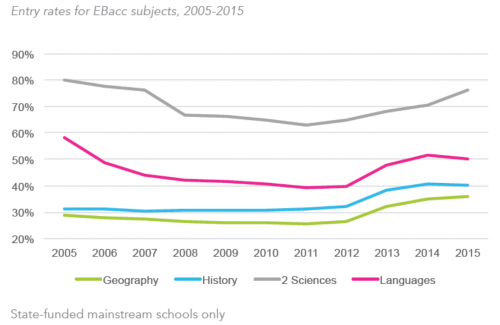
As a result of more pupils taking humanity and language subjects, and two science subjects, there has been an increase in the share of pupils filling the three Progress 8 slots reserved for EBacc subjects, even before Progress 8 and Attainment 8 become the measures which will determine performance table results. Had Progress 8 scores been measured, there would have been a 13 percentage point increase in the number of pupils filling the three EBacc subject slots between 2012 and 2015, to almost 70%.
In 2015, 95% of pupils also had results that would have counted in the ‘open’ Progress 8 slots, up on 84% three years ago. Much of this improvement is the result of schools switching away from qualifications that are no longer counted in Performance Tables following the Wolf Review.
Although not a subject that might be expected to have been affected by the EBacc, other accountability measures have had an impact on English literature entries, where 2015 entries surpassed 2005 levels. Under Progress 8 and Attainment 8, the subject gains extra desirability for schools, as a
pupil’s best result in either English language or English literature counts towards the performance measures. Not only that, but the best result is also doubled if both subjects have been entered. In 2016 a single combined GCSE in English will still be available, which can be doubled for Progress
8 purposes. However, schools already appear to be switching to separate GCSEs in language and literature pending the introduction of reformed GCSEs in 2017.
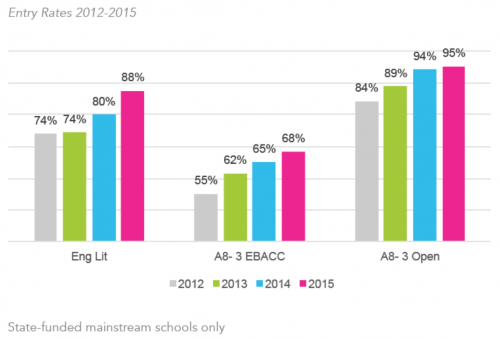
Entry patterns differ enormously by pupil background
This changing KS4 curriculum is affecting some pupils much more than others. We divide pupils into 20 evenly-sized bands, or vintiles, based on average prior attainment. Every subject grouping eligible for inclusion in EBacc is taken in larger numbers by higher prior attainment children. For those below a mean KS2 fine grade of 3.9 (i.e. working below expected standard), the majority do now take English literature, but very few are entered for a language GCSE.
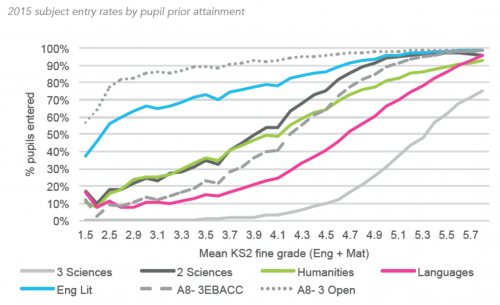
By looking at the difference in 2012 entry rates and 2015 entry rates across the 20 vintiles it is possible to see where the increased entry rates that have occurred stem from – and how they differ between subjects.
1. The increase in the numbers taking English literature, and subjects that fill the three open Progress 8 slots, has come mostly from lower attaining pupils.
The period covered captures the effect of the post-Wolf Review crackdown on ‘equivalent’ subjects, so much of the increase in Progress 8 open slots will have arisen from the switch back to GCSEs and vocational qualifications deemed high value enough to count under Progress 8. For English literature, lower achieving groups that were less likely to take a standalone literature GCSE have started to return to it – with entries up a third in some vintiles. With the better of a student’s English language and literature counting towards their Progress 8 performance, this increases the
chances of securing a high English grade for Progress 8 purposes.
2. The increase in those taking two sciences, and subjects that fill the three Progress 8 slots reserved for EBacc subjects, has come mostly from middle ability students.
The number of students with high prior achievement who take two science GCSEs is close to 100%. The same is true also for three GCSEs that would count towards these students’ ‘other EBacc subjects’ Progress 8 slots. This has broadly been the case since before 2012, so at the top end there has
been relatively little room for any increase in the number of students taking these subjects. It has been among middle achievers, where coverage of these EBacc/Progress 8 slots was, and to a certain extent still is, much patchier, that schools have identified more scope to boost entry numbers.
3. The increase in those taking languages and humanity subjects, meanwhile, has come predominantly from those with above-average prior attainment.
For languages, all prior attainment vintiles below an average point score of 4.1 saw entries increase by 5% or less; above this level, entries in every vintile increased by more than this amount, and some by up to 15%. The picture with humanity subjects was less marked, but still skewed towards high achievers.
Progress 8 is on the horizon: we expect schools to continue to become more similar in their KS4 curriculum offer
There is still significant variation in proportion of pupils entered for 3 EBacc subjects across
schools with similar intakes. We think schools are likely to continue to converge in their entry
patterns. If those schools with low entry rates compared to similar schools rise towards the
median then the overall 3 EBacc entry rate will rise from 68% in 2015 to 74%.
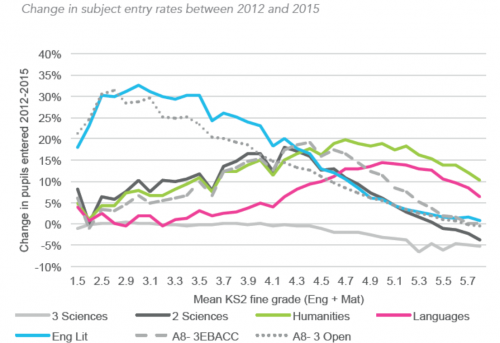
The issue now is whether shortages of teachers in EBacc subjects will present a serious threat to further rises in entries. It would take 2,000 extra teachers to deliver KS4 languages to all, for example. There was a noticeable stalling in the rise of humanities EBacc entries in 2015.
It is possible lack of specialist teachers is responsible for this.
Any reduction in the variation in entry rates across schools will in turn reduce variation in Progress 8. For those schools with already high EBacc entry rates, Progress 8 will start to fall unless the school can achieve increasing average point scores.
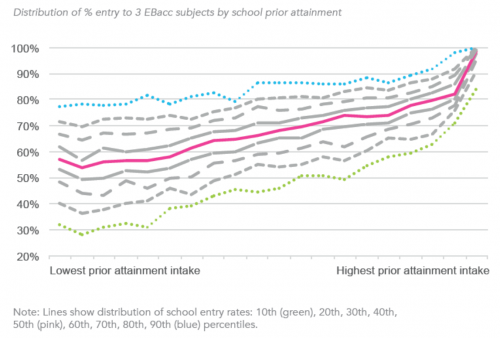
**We first published this analysis in our report for secondary schools called Floors, tables and coasters: shifting the education furniture in England’s secondary schools.

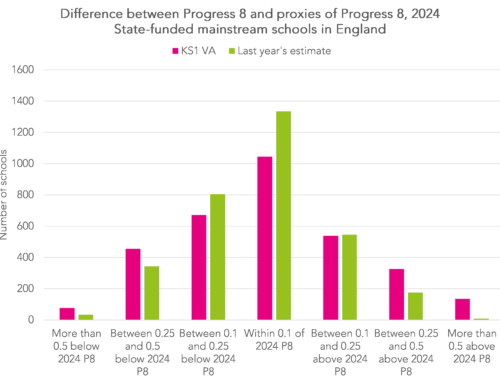
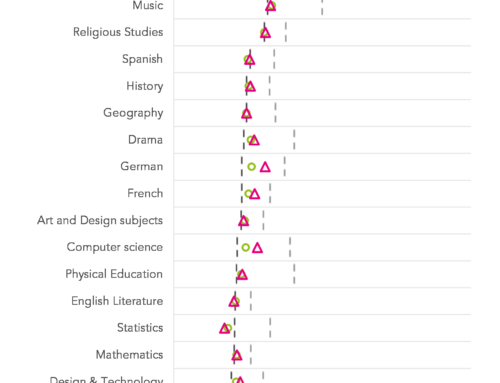
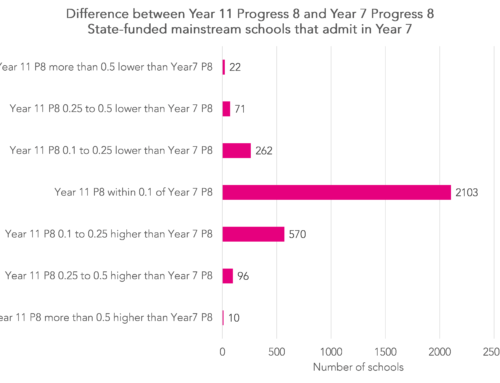
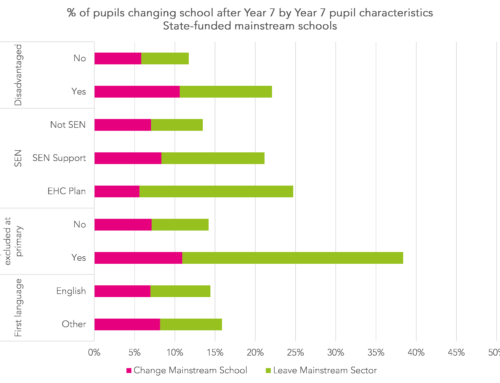
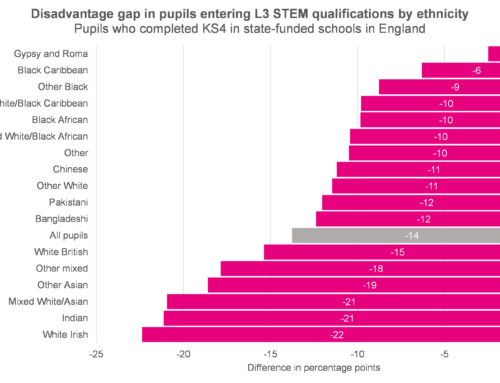
Leave A Comment